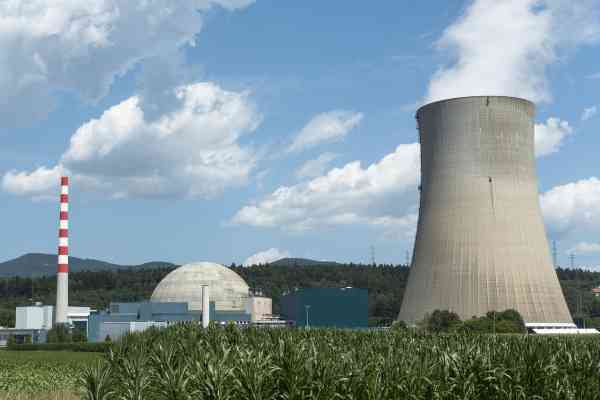March 10th, 2023 | 10:20 CET
Cameco, GoviEx Uranium, Fission Uranium - Elemental energy source
With the exception of Germany, the world's largest industrialized nations are focusing on expanding nuclear energy to achieve the climate targets they have set. However, due to the Ukraine conflict and possible sanctions against Russia, growing demand has been met with limited supply. The US alone obtains almost half of the uranium it needs from state-owned companies in Russia or Kazakhstan. But rising demand is meeting a supply that is too tight. The primary beneficiaries here are Western companies in production or close to it.
time to read: 3 minutes
|
Author:
Stefan Feulner
ISIN:
CAMECO CORP. | CA13321L1085 , GOVIEX URANIUM INC A | CA3837981057 , FISSION URANIUM CORP. | CA33812R1091
Table of contents:

"[...] We have built one of the largest land packages of any non-producer in the belt at over 440 sq.km and have made more than 25 gold discoveries on the property to date with 5 of these discoveries totaling about 1.1 million ounces of gold resources. [...]" Jared Scharf, CEO, Desert Gold Ventures Inc.
Author
Stefan Feulner
The native Franconian has more than 20 years of stock exchange experience and a broadly diversified network.
He is passionate about analyzing a wide variety of business models and investigating new trends.
Tag cloud
Shares cloud
Nuclear energy as the key
Germany aims to become greenhouse-neutral by 2045 and thus meet the global climate goal of limiting global warming to less than 2 degrees Celsius. This is to be achieved by accelerating the expansion of renewable energies to 100% in electricity generation and altogether abandoning fossil fuels. The share of nuclear power used to generate electricity in Germany was only 6.0% in the first half of 2022 and will be reduced to zero soon by the planned closure of the last three active nuclear reactors. In contrast, major industrialized countries such as Canada and the USA are focusing on constructing new, state-of-the-art reactors and subsidizing them massively. Canada has announced it will provide CAD 970 million to develop a grid-scale small modular reactor, which is being promoted as a key part of the country's plans to reduce emissions. Similarly, US President Joe Biden is supporting the uranium sector in the United States with a USD 4.3 billion plan to minimize dependence on Russia and address the energy crisis.
Domestic businesses benefit
The primary beneficiaries of the government programs are domestic uranium producers such as Cameco and Fission Uranium or exploration companies such as GoviEx Uranium that are about to start production. If there is an expected rebound in the uranium price, these, in particular, should perform with leverage over established producers. GoviEx is one of the largest uranium explorers on the African continent and is developing its flagship Madaouela project in Niger into the next producing mine. Niger is considered the fifth largest uranium producer globally and acted as the largest supplier of uranium oxide to the European continent in 2021. The government supports the domestic uranium industry tremendously, with a 20% interest in Madaouela. The project hosts one of the largest uranium resources in the world, with 100 million pounds of uranium oxide in measured and indicated mineral resources, plus inferred resources of 20 million pounds. Production is scheduled to begin in late 2025.
Last year's feasibility study indicated a net present value, net of 8% tax, of USD 140 million at an internal rate of return of 13.3%. At a mining rate of 2.60 million pounds per year and an expected mine life of more than 20 years, there would be potential to produce 50.8 million pounds of uranium oxide.
Start of production in the near future
In addition, GoviEx has another iron in the fire with the fully permitted Muntanga project in Zambia. The feasibility study is expected in 2024. A pre-feasibility study in 2017 indicated a net present value of USD 177 million, net of 8% tax, with a mine life of 11 years. At Muntanga, a field program of 15,500m of infill drilling was undertaken to upgrade the project's Dibbwi East resource from the inferred to the indicated category. In addition, GoviEx commissioned 9,000m of diamond drilling to obtain core samples for uranium assays to be used for confirmatory metallurgical test work.
On the other hand, the Falea uranium-silver-copper-gold project in Mali is to be sold. In order to focus on the two uranium-only properties, Madaouela and Muntanga, an agreement has been reached with African Energy Metals for the sale in a USD 5.5 million deal that will allow GoviEx to continue to retain a significant interest in the Falea project, as the payment includes a cash component as well as shares in African Energy Metals and a 3% NSR.
GoviEX, a prospective uranium company, has a market capitalization of CAD 114.29 million. Measured against the peer group, the Canadians still have significant upside potential. Uranium producers are valued at around USD 6.86 per pound, while developers are valued at only USD 2.28 per pound. As the start of production draws nearer, this valuation gap should be increasingly eliminated.
After a 10-year bear market, the uranium sector is at a turning point. The strong tailwinds reviving the nuclear industry are supported by aggressive climate targets, growing energy demand and major policy changes. In this regard, GoviEx Uranium is well-positioned with its two promising projects. An approaching start of production at Madaouela should offset the current undervaluation relative to the peer group.
Conflict of interest
Pursuant to §85 of the German Securities Trading Act (WpHG), we point out that Apaton Finance GmbH as well as partners, authors or employees of Apaton Finance GmbH (hereinafter referred to as "Relevant Persons") may hold shares or other financial instruments of the aforementioned companies in the future or may bet on rising or falling prices and thus a conflict of interest may arise in the future. The Relevant Persons reserve the right to buy or sell shares or other financial instruments of the Company at any time (hereinafter each a "Transaction"). Transactions may, under certain circumstances, influence the respective price of the shares or other financial instruments of the Company.
In addition, Apaton Finance GmbH is active in the context of the preparation and publication of the reporting in paid contractual relationships.
For this reason, there is a concrete conflict of interest.
The above information on existing conflicts of interest applies to all types and forms of publication used by Apaton Finance GmbH for publications on companies.
Risk notice
Apaton Finance GmbH offers editors, agencies and companies the opportunity to publish commentaries, interviews, summaries, news and the like on news.financial. These contents are exclusively for the information of the readers and do not represent any call to action or recommendations, neither explicitly nor implicitly they are to be understood as an assurance of possible price developments. The contents do not replace individual expert investment advice and do not constitute an offer to sell the discussed share(s) or other financial instruments, nor an invitation to buy or sell such.
The content is expressly not a financial analysis, but a journalistic or advertising text. Readers or users who make investment decisions or carry out transactions on the basis of the information provided here do so entirely at their own risk. No contractual relationship is established between Apaton Finance GmbH and its readers or the users of its offers, as our information only refers to the company and not to the investment decision of the reader or user.
The acquisition of financial instruments involves high risks, which can lead to the total loss of the invested capital. The information published by Apaton Finance GmbH and its authors is based on careful research. Nevertheless, no liability is assumed for financial losses or a content-related guarantee for the topicality, correctness, appropriateness and completeness of the content provided here. Please also note our Terms of use.




